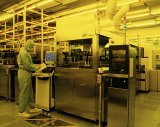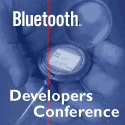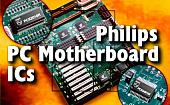In focus
• Wafer fab capacity boosted by 50%
• Philips Semiconductors - one company, total Bluetooth solutions
• PC Motherboard ICs
• Telecom '99
• Silicon MMICs: Smart RF solutions for wireless products
• Nexperia™ Digital Video Platform
• SiliconMAX™: unsurpassed performance for SMPS and DC/DC converter applications
• Introducing: "eNews", Your personalized EMAIL service!
• Philips Semiconductors' sales grew by 23 percent in the first quarter of 1998
• The new I/O-rich XA-S3
 Production capacity at Philips Semiconductors' MOS4YOU plant in Nijmegen, the Netherlands,
has been given a one-quarter-billion-dollar cash injection.
Production capacity at Philips Semiconductors' MOS4YOU plant in Nijmegen, the Netherlands,
has been given a one-quarter-billion-dollar cash injection.
The flagship facility can now produce 300,000 eight-inch wafers a year - a 50% increase.
Anticipating the current upswing in the semiconductors industry, the expansion - officially
inaugurated today - jacks up production of wafers using state-of-the-art 0.18 micron CMOS technology.
These will be used to meet consumer demand for TV text and DVD products, as well as for mobile phones
and smart cards.
 Philips Semiconductors is the first company who can deliver Bluetooth
Chipsets. Partnering with Philips Semiconductors in your Bluetooth
developments means guaranteed success, leading edge solutions and short
time-to-market for new products. It also means a clearly defined road-map
to higher levels of integration - culminating in ultimate low-cost
single-chip Bluetooth solutions. Visit us at the Bluetooth Developers
Conference in Los Angeles.
Philips Semiconductors is the first company who can deliver Bluetooth
Chipsets. Partnering with Philips Semiconductors in your Bluetooth
developments means guaranteed success, leading edge solutions and short
time-to-market for new products. It also means a clearly defined road-map
to higher levels of integration - culminating in ultimate low-cost
single-chip Bluetooth solutions. Visit us at the Bluetooth Developers
Conference in Los Angeles.
 Philips Semiconductors, the inventor of I2C, now offers motherboard designers a comprehensive range of support ICs for laptop, desktop,
workstation, and server platforms. Philips Clock (PCK) products support Intel specified CK97, CK98/Rambus, and value (e.g. CK810)
platforms as well as JEDEC-defined PC133 and DDR standards. Also offered are a complementary set of registered drivers and PLLs for
PC100, PC133, and DDR memory modules. New CBT and GTL products interface to processors and chipsets, while Philips Configuration
Architecture (PCA) ICs provide a wide range of I2C and SMBus system management functions.
Philips Semiconductors, the inventor of I2C, now offers motherboard designers a comprehensive range of support ICs for laptop, desktop,
workstation, and server platforms. Philips Clock (PCK) products support Intel specified CK97, CK98/Rambus, and value (e.g. CK810)
platforms as well as JEDEC-defined PC133 and DDR standards. Also offered are a complementary set of registered drivers and PLLs for
PC100, PC133, and DDR memory modules. New CBT and GTL products interface to processors and chipsets, while Philips Configuration
Architecture (PCA) ICs provide a wide range of I2C and SMBus system management functions.
 Philips Semiconductors and VLSI Technology together have 100% of key technologies and competencies now in-house and
at Telecom '99 are showcasing exciting solutions to create the next generation of data-centric mobile communications
products, bringing services such as mobile Internet and personal multimedia to consumer mass markets. These include
a new single-chip baseband solution for General Packet Radio Service (GPRS) over GSM that allows data to be transferred
across the wireless domain at high speed, thereby improving mobile applications such as fax, e-mail and paging. Also,
the roadmap for Bluetooth - the small form factor, low-cost, short range radio link that will revolutionize the way
laptop PCs, mobile phones and other portable devices are interconnected and which promises to pave the way for
affordable wireless home networking.
Philips Semiconductors and VLSI Technology together have 100% of key technologies and competencies now in-house and
at Telecom '99 are showcasing exciting solutions to create the next generation of data-centric mobile communications
products, bringing services such as mobile Internet and personal multimedia to consumer mass markets. These include
a new single-chip baseband solution for General Packet Radio Service (GPRS) over GSM that allows data to be transferred
across the wireless domain at high speed, thereby improving mobile applications such as fax, e-mail and paging. Also,
the roadmap for Bluetooth - the small form factor, low-cost, short range radio link that will revolutionize the way
laptop PCs, mobile phones and other portable devices are interconnected and which promises to pave the way for
affordable wireless home networking.
Philips Semiconductors' BGA20XX family of MMIC amplifiers and mixers provides unrivalled RF gain for silicon devices. Operating up to and beyond 2.4 GHz, the MMICs feature several optimized passive components on-chip to automatically compensate for temperature and process variations. Consequently, they can reduce the size and design time for many wireless products.
 The Nexperia™ Digital Video Platform (DVP) enables the next generation of
interactive digital home entertainment systems to be created quickly,
cheaply and in a future proof way.
The Nexperia™ Digital Video Platform (DVP) enables the next generation of
interactive digital home entertainment systems to be created quickly,
cheaply and in a future proof way.
 Philips Semiconductors' new SiliconMAX™ power MOSFET range - a next generation development of the company's
advanced TrenchMOS technology - brings the benefits of ultra-low RDS(on) and high-speed switching to applications
requiring transistors with voltage ratings up to 200V.
Philips Semiconductors' new SiliconMAX™ power MOSFET range - a next generation development of the company's
advanced TrenchMOS technology - brings the benefits of ultra-low RDS(on) and high-speed switching to applications
requiring transistors with voltage ratings up to 200V.
 Have the latest information delivered directly to you through Philips Semiconductors eNews.By subscribing you will periodically receive an
mail with links back to this website identifying the latest products and business news that match your interest.
Have the latest information delivered directly to you through Philips Semiconductors eNews.By subscribing you will periodically receive an
mail with links back to this website identifying the latest products and business news that match your interest.
 Subscribe now!
Subscribe now!
| Philips Semiconductors' sales grew by 23 percent in the first quarter of 1998 (1998-05-06) |  |
Philips Semiconductors' sales grew by 23 percent in the first quarter of 1998, with all major businesses contributing, it was announced
on Wednesday 22 April. Income from operations increased to NLG 498 million from NLG 343 million. Capacity utilization benefited strongly
from the high sales level and more than compensated for price erosion.  more
information
more
information
Philips Semiconductors continues to pursue a strategy of rolling out numerous "derivatives" based on the XA core architecture.
The new I/O-rich XA-S3 is the latest example of this value-added approach in action.
 The latest issue of XA news gives more information on the
The latest issue of XA news gives more information on the
 XA family of 16-bit microcontrollers.
XA family of 16-bit microcontrollers.